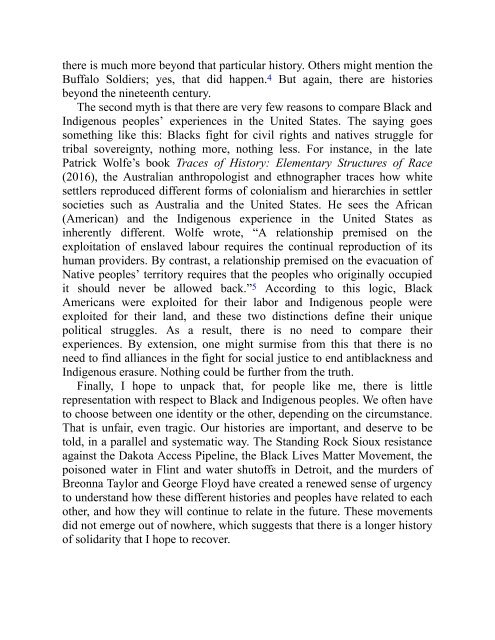You also want an ePaper? Increase the reach of your titles
YUMPU automatically turns print PDFs into web optimized ePapers that Google loves.
<strong>the</strong>re is much more beyond that particular history. O<strong>the</strong>rs might mention <strong>the</strong><br />
Buffalo Soldiers; yes, that did happen. 4 But again, <strong>the</strong>re are histories<br />
beyond <strong>the</strong> nineteenth century.<br />
The second myth is that <strong>the</strong>re are very few reasons to compare Black and<br />
<strong>Indigenous</strong> peoples’ experiences in <strong>the</strong> <strong>United</strong> <strong>States</strong>. The saying goes<br />
something like this: Blacks fight for civil rights and natives struggle for<br />
tribal sovereignty, nothing more, nothing less. For instance, in <strong>the</strong> late<br />
Patrick Wolfe’s book Traces <strong>of</strong> <strong>History</strong>: Elementary Structures <strong>of</strong> Race<br />
(2016), <strong>the</strong> Australian anthropologist and ethnographer traces how white<br />
settlers reproduced different forms <strong>of</strong> colonialism and hierarchies in settler<br />
societies such as Australia and <strong>the</strong> <strong>United</strong> <strong>States</strong>. He sees <strong>the</strong> African<br />
(American) and <strong>the</strong> <strong>Indigenous</strong> experience in <strong>the</strong> <strong>United</strong> <strong>States</strong> as<br />
inherently different. Wolfe wrote, “A relationship premised on <strong>the</strong><br />
exploitation <strong>of</strong> enslaved labour requires <strong>the</strong> continual reproduction <strong>of</strong> its<br />
human providers. By contrast, a relationship premised on <strong>the</strong> evacuation <strong>of</strong><br />
Native peoples’ territory requires that <strong>the</strong> peoples who originally occupied<br />
it should never be allowed back.” 5 According to this logic, Black<br />
Americans were exploited for <strong>the</strong>ir labor and <strong>Indigenous</strong> people were<br />
exploited for <strong>the</strong>ir land, and <strong>the</strong>se two distinctions define <strong>the</strong>ir unique<br />
political struggles. As a result, <strong>the</strong>re is no need to compare <strong>the</strong>ir<br />
experiences. By extension, one might surmise from this that <strong>the</strong>re is no<br />
need to find alliances in <strong>the</strong> fight for social justice to end antiblackness and<br />
<strong>Indigenous</strong> erasure. Nothing could be fur<strong>the</strong>r from <strong>the</strong> truth.<br />
Finally, I hope to unpack that, for people like me, <strong>the</strong>re is little<br />
representation with respect to Black and <strong>Indigenous</strong> peoples. We <strong>of</strong>ten have<br />
to choose between one identity or <strong>the</strong> o<strong>the</strong>r, depending on <strong>the</strong> circumstance.<br />
That is unfair, even tragic. Our histories are important, and deserve to be<br />
told, in a parallel and systematic way. The Standing Rock Sioux resistance<br />
against <strong>the</strong> Dakota Access Pipeline, <strong>the</strong> Black Lives Matter Movement, <strong>the</strong><br />
poisoned water in Flint and water shut<strong>of</strong>fs in Detroit, and <strong>the</strong> murders <strong>of</strong><br />
Breonna Taylor and George Floyd have created a renewed sense <strong>of</strong> urgency<br />
to understand how <strong>the</strong>se different histories and peoples have related to each<br />
o<strong>the</strong>r, and how <strong>the</strong>y will continue to relate in <strong>the</strong> future. These movements<br />
did not emerge out <strong>of</strong> nowhere, which suggests that <strong>the</strong>re is a longer history<br />
<strong>of</strong> solidarity that I hope to recover.


















